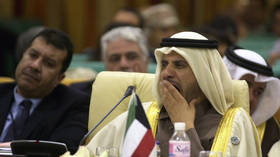Crude oil prices plunge as conflict between US and Iran cools
Oil prices sank on Tuesday after President Trump and US Secretary of State Mike Pompeo struck a softer tone on Iran. The market acted swiftly, selling off crude oil.
The comments come a day after Iran’s foreign minister Javad Zarif spoke with NBC News, where he seemed to crack open the door to negotiations of some sort. When asked what it would take to get Iran to the bargaining table, Zarif took issue with the premise of the question. “No, we are at the bargaining table. It is the United States that left the bargaining table,” he said. “And they are always welcome to return.”
He then framed Iran’s recent moves to withdraw from parts of the 2015 nuclear deal as a response to the US not holding up its end of the deal. The Trump administration unilaterally left the agreement in 2018.
But again, Zarif seemed to open the door. When NBC News’ Lester Holt asked whether or not Iran’s latest decisions to begin stockpiling low-enriched uranium, among other maneuvers, could be reversed, Zarif was quick to respond. “Of course. It can be reversed within hours.”
So, that prompted NBC’s Holt to ask if Iran would negotiate if sanctions were lifted. “The United States is addicted, unfortunately, to sanctions,” Zarif said, noting longstanding restrictions placed on Iran. However, he took particular issue with the sanctions that were implemented since last year under the Trump administration. Those are the sticking point. “Once those sanctions are lifted, then room for negotiation is wide open,” Zarif said.
Perhaps even more notable was how Zarif responded when asked about Iran’s ballistic missile program. The US has issued a series of demands regarding Iranian missiles, an issue that was not part of the 2015 nuclear deal. That seemed to be a non-starter, but Zarif didn’t necessarily dismiss it as out of hand. He said that Iran would be willing to talk about anything after the US recommits the deal they already have, referring to the nuclear agreement. He also said that the US needed to stop sending weapons to Saudi Arabia and the UAE. It all seems highly unlikely, but the tone was more open than it had been in the past.
Also on rt.com US to punish anyone using EU's alternative payment system with Iran to skirt sanctionsZarif even mentioned job creation in the US that would have come from expanded trade between the two countries (Iran was in the midst of planning major airplane purchases from Boeing before the Trump administration scrapped the deal), and said that Tehran would welcome American businesses back to Iran if their issues could be resolved. Perhaps Zarif was hoping to appeal to President Trump’s desire to strike deals.
The lengthy interview and rather accommodating tone from Zarif appeared to succeed in softening up the Trump administration. President Trump said at a cabinet meeting on Tuesday that the US was “not looking for regime change,” although he added that he did “want them out of Yemen.”
“They’d like to talk, and we’ll see what happens,” Trump said.
Following those comments, Sec. Pompeo said that “for the first time” Iran was “ready to negotiate on their missile program.”
Oil prices plunged by 4 percent on Tuesday after Trump and Pompeo seemed to lay the groundwork for de-escalation. There are no formal next steps that the two countries might take, but the positive back-and-forth is long way from where they were a few weeks ago, on the eve of a US military strike.
Iran’s oil exports are still down to about 400,000 bpd, sharply lower than from earlier this year. However, the de-escalation potentially removes one of the most significant bullish factors in the oil market. “What were tailwinds have become headwinds,” Bob Yawger, director of energy futures at Mizuho in New York, told Reuters.
The nascent thaw in US-Iran relations comes after the US Gulf of Mexico avoided serious damage from Hurricane Barry, and 1.3 million barrels per day of disrupted oil production is in the process of coming back online. Moreover, it was only a few days ago that the IEA and OPEC warned that the market is set to see a substantial supply surplus next year, absent further action from the OPEC+ coalition.
WTI was down to $57 on Tuesday and Brent fell by 3 percent, dipping below $65.
This article was originally published on Oilprice.com
















